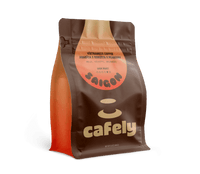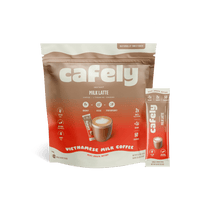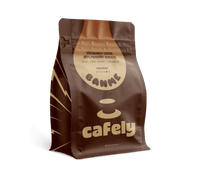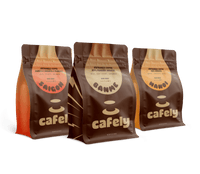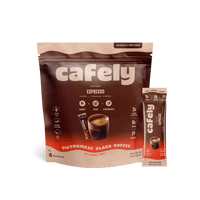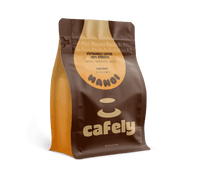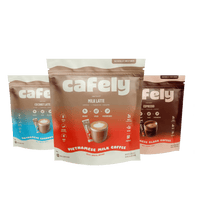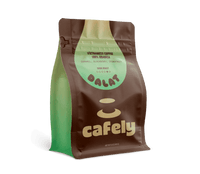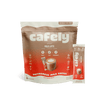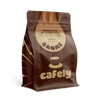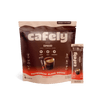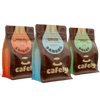When your digestive system runs smoothly, it supports your energy, mood, metabolism, and immune response. But when things slow down, meals feel heavy, bloating becomes a daily nuisance, or your bathroom habits get unpredictable.
Digestive issues can sneak in through poor diet, chronic stress, inconsistent eating times, or even overuse of antibiotics [1].
That’s where digestive boosters come in.
The right habits, foods, and digestive health supplements can gently get your system back on track and improve how your body feels after every meal.
In this article, we’ll explore 15 simple and natural ways to restore balance…
What Are Digestive Boosters?
A digestive booster is anything that helps your body break down food, absorb nutrients, and keep things moving [2].
These might be natural foods, herbal teas, supplements, or simple routines that support your gut's natural flow.
There are a few key types of digestive boosters:
- Digestive Enzymes — Help break down proteins, fats, and carbs.
- Probiotics and Fermented Foods — Replenish good gut bacteria.
- Prebiotics and Fiber — Feed the beneficial microbes that keep things regular.
- Herbs and Teas — Soothe the digestive tract and reduce bloating or discomfort.
- Lifestyle Practices — Support the gut-brain connection and regulate digestion holistically.
You don’t need to overhaul your life to feel better. Just a few of these additions can make meals feel lighter, more energizing, and way less stressful on your system.
15 Digestive Boosters for Better Gut Health
If your gut has been feeling sluggish, backed up, or just “off,” you are not alone — and you are not without options.
Below are the 15 best boosters for digestion that can make a difference.
Some are foods, others are supplements, but all are believed to support smoother digestion, better nutrient absorption, and less digestive discomfort.
1. Ginger

Ginger naturally stimulates saliva, bile, and digestive enzymes, all of which help your body process food more efficiently [3].
If you’re feeling bloated or nauseous after eating, a little ginger can smooth things out and reduce that heavy post-meal slump.
Try sipping ginger tea 15 minutes before a meal or grating a small piece into a stir-fry or smoothie. Capsules work too if the flavor isn’t to your taste.
Note: Ginger can thin the blood, so talk to your doctor if you’re on medications. Too much can also cause heartburn in some people, so start small.
2. Yogurt (Plain, With Probiotics)
Plain yogurt with active probiotics can help repopulate your gut with beneficial bacteria, which supports smoother digestion, better nutrient absorption, and less bloating over time [4].
Stick to plain, unsweetened versions — sugar-packed yogurts can counteract the benefits. Greek yogurt is a solid pick for higher protein and fewer carbs. If you’re dairy-sensitive, there are coconut or almond alternatives with probiotics.
Note: If lactose tends to bother you, try a small serving first. Some people find they tolerate yogurt better than milk, thanks to the fermentation process.
3. Fermented Vegetables
These are probiotic goldmines that introduce a variety of good bacteria to your gut — think sauerkraut, kimchi, pickled beets, and fermented carrots [5]. They also tend to have enzymes that help with digestion naturally.
You don’t need much. Just a forkful with lunch or dinner can help diversify your microbiome and keep your system regular.
Note: Fermented veggies are often high in sodium, so go easy if you’re watching your salt. If you’re recovering from a round of antibiotics, give your gut a few days before loading up — or pair with a probiotic supplement to ease in.
4. Digestive Enzymes (Like Amylase, Lipase, and Protease)
Your body makes digestive enzymes on its own, but sometimes you need a little help, especially after rich meals, when you’re under stress, or as you get older.
Enzyme blends can break down proteins, carbs, and fats so food doesn’t sit heavy in your stomach [6].
These are usually taken right before or with meals, and they’re especially helpful if you often feel sluggish or bloated after eating.
Important tip: Don’t rely on enzymes long-term without checking with a healthcare professional. Overuse can interfere with your body’s natural enzyme production. Use them strategically, not daily (unless advised).
5. Peppermint Tea
If your stomach feels tight, crampy, or gassy, peppermint tea might be your solution. It relaxes the muscles in your digestive tract and can help ease spasms, bloating, and that uncomfortable post-lunch pressure [7].
Brew a cup after meals, or before bed if late dinners leave you feeling off.
Avoid it if you deal with acid reflux or GERD. Peppermint can relax the muscle that keeps stomach acid from rising, which might make acid reflux worse for some people.
6. Bone Broth
Bone broth is rich in gelatin, collagen, and glutamine — it may help repair the gut lining and support a smoother digestive process, especially if you're dealing with bloating, IBS, or leaky gut issues [8].
A warm mug in the morning or before meals can soothe inflammation and set the tone for easier digestion, much like try getting the best morning coffee for an energizing start.
Go for homemade or low-sodium versions. Commercially packaged bone broth often contains excessive salt and preservatives that defeat the purpose.
7. Fennel Seeds
These tiny seeds pack a surprising punch. Fennel seeds help relax your digestive tract, ease gas buildup, and reduce bloating [9].
Chewing half a teaspoon after meals — like they do in many Indian households — can offer immediate relief if your belly feels tight or swollen.
They’re generally safe, but if you’re pregnant, talk to your doctor first. Fennel has mild estrogenic effects and isn’t always advised during pregnancy.
8. Chia Seeds
High in soluble fiber and omega-3s, chia seeds turn into a gel-like texture when soaked, helping your stool move smoothly through your gut [10]. They also help feed beneficial bacteria, making them a prebiotic.
Add a tablespoon to your smoothies, overnight oats, or yogurt. Just don’t skip the liquid. Dry chia seeds can absorb water from your gut and cause discomfort if you don’t hydrate properly.
9. Apple Cider Vinegar (ACV)
A spoonful of ACV diluted in water before meals can stimulate stomach acid production, especially helpful if you tend to feel heavy or bloated after eating [11]. It supports protein breakdown and overall digestive readiness.
Start with 1 teaspoon in a full glass of water. Rinse your mouth after, since ACV is acidic and can wear down tooth enamel over time. Also, skip it if you’re on NSAIDs or have a sensitive stomach lining.
10. Papaya (Papain)

Papaya contains papain, a natural enzyme that helps break down proteins in your stomach, especially useful after a high-protein meal [12]. It’s tropical, refreshing, and gentle on the gut.
It’s a good choice for post-meal bloating or discomfort. A heads-up if you have a latex allergy — papain may trigger a reaction due to cross-reactivity.
11. Kefir
This fermented dairy drink is rich in probiotics, with multiple types that can help restore gut balance, ease constipation, and improve overall digestion [13].
It’s easy to find in most grocery stores, and a glass a day can go a long way. If you’re lactose-sensitive, look for coconut or water-based versions, or test small amounts to see how your body reacts.
12. Artichokes
Artichokes are rich in inulin, a prebiotic fiber that feeds healthy gut bacteria [14]. They also help stimulate bile flow, which your body uses to digest fats more efficiently.
You can roast them, steam them, or blend them into dips. Just a half-cup a few times a week may improve digestion and even reduce IBS symptoms.
If you have ragweed allergies, proceed with caution — artichokes are part of the same family.
13. Slippery Elm
This herb coats your digestive tract with a soothing gel, easing irritation in the stomach and intestines. Slippery Elm has been used for centuries to calm symptoms of acid reflux, diarrhea, and inflammation [15].
It comes in powder, capsule, or lozenge form. Take it between meals — not with meds — because it can interfere with nutrient and medication absorption if taken too close together.
14. Turmeric (Curcumin)
You probably know turmeric as an anti-inflammatory, but it also supports bile flow and digestive enzyme activity, making it great for sluggish digestion or post-meal heaviness [16].
Add turmeric powder to soups, teas, or golden milk blends. Aim for around 500 to 1000 mg of curcumin daily for digestive support. If you’re on blood thinners, check with your doctor — turmeric can mildly thin the blood as well.
15. Whole Grains
Whole grains like oats, brown rice, quinoa, and barley provide the fiber your gut needs to stay regular. Fiber bulks up your stool, feeds good bacteria, and keeps things moving — all of which help prevent bloating, constipation, and irregularity [17].
Choose unprocessed, minimally refined grains. Instant oatmeal and white bread won’t deliver the same benefit. If you’re new to high fiber, increase slowly and drink extra water to avoid gas or discomfort.
Key Benefits of Digestive Boosters
You’ve added the ginger, the kefir, and the fiber — now what?
When digestive boosters are doing their job, here’s what you might notice [18]:
1. Better Nutrient Absorption
It’s not just what you eat. It’s what your body can absorb.
Digestive boosters — especially enzymes, probiotics, and fermented foods — help break down carbs, fats, and proteins into forms your gut can actually use.
If your digestion is sluggish, nutrients can pass through without being absorbed, leaving you depleted even if you’re eating well.
With improved absorption, your body can finally use the magnesium from spinach, the omega-3s from flax, and the iron from lentils instead of flushing them out undigested.
2. Less Bloating and Gas
Chronic bloating is often a sign of fermentation from undigested food, feeding bad bacteria in your gut.
Boosters like fennel, peppermint, slippery elm, and digestive enzymes can help move things along more smoothly, reducing buildup and air pockets. Fiber (like chia and oats) helps regulate motility, so gas does not sit in your system all day.
Result: Less discomfort, less tight waistband after meals, and no more lying on the floor trying to unknot your stomach.
3. A Stronger Immune System
70% of your immune cells live in your gut [19].
When your gut lining is inflamed or your microbiome is off-balance, your body’s immune defenses become reactive or sluggish.
Probiotics (from yogurt, kefir, and kimchi), prebiotics (like artichokes), and anti-inflammatory herbs (like turmeric) support a healthier microbiome, which in turn trains your immune system to respond appropriately, not excessively or too late.
This may also help with seasonal allergies, skin flares, and getting sick less often.
4. More Regular Bowel Movements
If you’re not pooping consistently, your body isn’t clearing out what it doesn’t need.
Fiber from whole grains, chia seeds, and artichokes provides bulk and moisture to stool, while fermented foods keep things moving. Digestive boosters like magnesium glycinate or slippery elm soothe the gut lining and help regulate contractions (peristalsis).
Regularity equals less toxin buildup, better hormone clearance, and more energy.
5. Mental Clarity and Mood Support (Gut-Brain Axis)
There’s a reason brain fog often clears up when your digestion improves.
The gut produces over 90% of your serotonin, and gut inflammation is linked to mood swings, anxiety, and even depressive symptoms [20].
Improving digestion with calming adaptogens (like ashwagandha), omega-3s, fermented foods, and gentle fiber can help rebalance the gut-brain connection and give you more clarity, steadier moods, and better focus.
You’re not imagining that connection between your stomach and your brain — science confirms it.
Risks of Digestive Boosters & What to Look Out For

Just because something is “natural” does not mean it’s risk-free. To improve digestion naturally, you still need to be intentional about what you use — and how.
1. Overusing Supplements or Ignoring the Root Cause
Digestive enzymes, ACV, and herbal capsules can help, but they’re not meant to replace real food or a proper diagnosis.
Using them every day without addressing food intolerances, stress, or gut imbalances can backfire. In some cases, your body can become dependent on supplemental enzymes instead of producing its own.
2. Self-Treating Chronic Symptoms Without Help
If you’ve been bloated for months or your digestion shuts down during stressful weeks, don’t ignore it. That could be a sign of SIBO, IBS, leaky gut, or something more serious like an ulcer or gastritis.
Digestive boosters may relieve symptoms, but they won’t solve deeper imbalances without addressing the root.
Don’t use peppermint or ginger to mask stomach pain daily. Get checked if something feels off for more than two weeks.
3. Medication Interactions
Herbs and acids (like turmeric, ACV, slippery elm) can interfere with common medications:
- Blood thinners— Avoid turmeric, ginger, and ginseng.
- NSAIDs— Avoid vinegar or acidic supplements that can aggravate the stomach lining.
- Antibiotics— Space out probiotics 2–3 hours apart, or they may get wiped out.
- PPIs (Proton Pump Inhibitors)— Adding acid (ACV) on top of these can worsen symptoms.
Always check interactions, even if something is sold over the counter.
4. Hidden Additives in “Healthy” Packaged Foods
A yogurt that claims to be probiotic-rich may be loaded with added sugar.
A turmeric capsule could contain fillers or colorants that may trigger inflammation.
Packaged bone broth often contains excess sodium or MSG.
Read the label. If your gut is sensitive, even small additives can undo the good stuff.
Signs Your Digestion Needs Help
Still unsure whether you actually need digestive boosters? Your body will tell you — if you know what to look for.
Here are some signs to look out for:
1. Bloating, Gas, Constipation, or Diarrhea
These are the most obvious signs your digestion is struggling. If you feel full after just a few bites, can’t go for days (or go too often), or get gassy from basic meals, your gut may be inflamed, lacking enzymes, or missing good bacteria.
2. Low Energy or Fatigue
If you’re sleeping 8 hours and still dragging, your digestion might be part of the problem. Poor nutrient absorption means your cells are running on empty, even with well-balanced meals.
Boosting digestion can help nutrients reach your bloodstream more effectively, and that means more fuel for your brain and muscles.
3. Skin Breakouts, Dullness, or Inflammation
Your skin is a detox organ. If your gut is clogged or inflamed, that waste can show up as breakouts, dryness, or redness.
Gut-supporting foods like turmeric, fiber, fermented veggies, and omega-3s help reduce systemic inflammation and clear up your complexion from the inside out.
4. Mood Swings or Brain Fog
If you feel anxious, down, or mentally “cloudy” more often than not, look at your gut. Imbalanced microbiomes can impact dopamine and serotonin production.
This is where digestive health supplements can indirectly support mental clarity by calming inflammation and restoring gut-brain signals.
5. Sugar Cravings and Bad Breath
Frequent cravings for sweet foods or carbs can be a sign of dysbiosis — an imbalance where bad bacteria or yeast are thriving.
Fermented foods, prebiotics, and better digestion can starve those bugs and help rebalance your system. If your breath is funky despite good hygiene, it could be coming from inside your digestive tract.
Lifestyle Tips to Support Digestion Naturally

You can take all the supplements in the world, but if your daily habits are wrecking your gut, they can only do so much. Sometimes, it’s the smallest changes that have the biggest impact on digestion.
If you’ve been looking for digestive health supplements or trying to improve digestion naturally, you must implement lifestyle changes as well.
Your body already has the tools — these tips help you use them better:
1. Chew Your Food Thoroughly
Yes, it sounds basic — but it might be the most underrated digestive booster of them all.
Digestion starts in the mouth. Saliva contains enzymes that begin breaking down carbs and fats before they even hit your stomach. When you rush through a meal, food enters your digestive tract in chunks, forcing your stomach and intestines to work overtime.
Aim for at least 20–30 bites per mouthful, especially with fibrous foods like meat, grains, and raw veggies. Your gut will thank you.
2. Eat Slowly and Mindfully
Your gut is a sensitive system, and it operates best when you’re calm, not in fight-or-flight mode.
Mindless eating — in front of a screen, in the car, or while multitasking — can confuse your body’s signals. You may not produce enough stomach acid, you may overeat, or you may trigger bloating from swallowing too much air.
Instead, sit down, take a few deep breaths, focus on the taste and texture of your food, and give your brain time to register fullness — usually about 20 minutes.
This one shift can reduce indigestion, gas, and even emotional eating.
3. Stay Hydrated
Water is essential for digestion — it helps dissolve nutrients, move food through your intestines, and keep things soft and regular.
If you’re constipated or your digestion feels sluggish, dehydration might be part of the problem. Drinking enough water can even reduce acidity or heartburn by diluting excess stomach acid — just avoid chugging large amounts during meals.
Sip water consistently throughout the day. Add lemon or cucumber for a gentle detox boost, and if you're one of the people regularly drinking coffee, increase your water intake to counteract its diuretic effects or switch to a warm mug of any coffee alternative, such as herbal tea or a chicory blend, for a soothing ritual without the dehydrating effects.
4. Move Your Body Regularly
You don’t need a gym membership to help your gut.
Physical activity stimulates intestinal contractions (peristalsis), helping food move through the digestive system more efficiently. It also reduces inflammation, balances blood sugar, and supports a healthier gut microbiome.
Try this: Go for a 10–15 minute walk after meals. It’s one of the best ways to prevent bloating, gas, and post-meal sluggishness.
Even simple movement — stretching, housework, dancing — keeps your digestion humming along.
5. Manage Stress
Stress doesn’t just mess with your mood — it shuts down digestion.
When your brain senses danger (yes, even email stress), it diverts energy away from non-essential functions like digestion. That means less stomach acid, fewer enzymes, and slower movement in the gut.
Over time, chronic stress can cause or worsen IBS, bloating, and food intolerances.
Tactics that help:
- Deep breathing before meals (3–4 belly breaths).
- Yoga, stretching, or body scans.
- Keeping a simple morning or bedtime routine.
- Journaling or using a brain dump before bed to reduce mental noise.
Sleep is part of this, too. Poor sleep increases cortisol, disrupts the microbiome, and reduces motility. If you want to improve digestion naturally, a consistent 7–9 hour sleep window is non-negotiable.
When to See a Doctor About Digestive Discomfort
Natural remedies and lifestyle shifts can do a lot, but not everything. Sometimes your gut needs more help, and that’s okay.
Knowing when to seek medical advice is just as important as knowing what to eat.
Persistent or Severe Digestive Symptoms
If you’re constantly dealing with bloating, nausea, acid reflux, constipation, or diarrhea, and it has been going on for more than two weeks, talk to a healthcare provider.
You might be dealing with:
- IBS (Irritable Bowel Syndrome).
- IBD (Crohn’s or Ulcerative Colitis).
- Celiac disease.
- SIBO (Small Intestinal Bacterial Overgrowth).
- Food sensitivities or intolerances.
Blood in Your Stool or Unexplained Weight Loss
Red or black stool, or ongoing fatigue paired with rapid weight loss, are never normal. These can be signs of internal bleeding, inflammation, ulcers, or malabsorption syndromes.
In these cases, see a doctor immediately. Catching these conditions early makes a huge difference in treatment outcomes.
Symptoms Are Interfering with Daily Life
Are you skipping social plans because your stomach feels off? Can’t focus at work because of bloating or pain? Are you scared to eat before leaving the house?
That’s not “just a sensitive stomach” — it’s your body telling you something’s wrong.
If gut issues are affecting your quality of life, it’s time for a full workup. You deserve better than coping in silence or living with your symptoms.
Long-Term Use of OTC Remedies Without Relief
Still taking digestive enzymes daily with no change? Living on antacids? Relying on laxatives more than once or twice a week?
These are all short-term tools. When used too long, they can backfire, especially if the root problem is microbial, hormonal, or structural.
Bring a list of everything you’ve tried (including supplements) when you see your doctor. It helps them build a more effective plan tailored to your actual body, not just your symptoms.
Time to Take Control of Your Digestion
If you’re here, you already care about your health, and your gut’s playing a big part in how you feel every day. The best part? You don’t need to overhaul everything overnight.
Start with small, steady habits. Try one digestive booster at a time. You’ll be surprised how fast things shift when you support your body on every level — food, supplements, movement, and mindset.
Your digestion deserves your attention. So does your energy, your mood, and your long-term health.
FAQs: Digestive Boosters
Digestive health can be confusing, especially with so many boosters out there.
These quick answers clear up the most common questions to help you choose what works:
1. What Are Digestive Boosters?
Digestive boosters are natural aids, like certain foods, herbs, or supplements, that help your body break down and absorb nutrients more efficiently. They support smoother digestion, reduce discomfort, and improve gut function over time.
2. Can I Take Digestive Enzymes Every Day?
Not without guidance. Using enzymes daily without a diagnosed need may reduce your body’s enzyme production. Talk to a healthcare provider before using them long-term.
3. Are Probiotics Better from Food or Supplements?
Both can work, but food-based sources like yogurt or kefir offer extra nutrients and fiber that improve absorption. Supplements may be useful when higher doses or specific strains are needed.
4. What’s the Best Food for Gut Health?
Fermented foods like kimchi, sauerkraut, and plain probiotic yogurt are top choices. They introduce live beneficial bacteria that help balance your gut microbiome naturally.
5. Can Digestive Boosters Help with Bloating?
Yes, options like ginger, fennel seeds, peppermint tea, and enzymes can ease bloating by relaxing your gut muscles and improving food breakdown.
6. Are There Any Side Effects?
Some boosters may cause mild side effects like gas, nausea, or allergic reactions. Others may interfere with medications. Always read labels and start with small amounts.
7. How Long Until I See Results?
It depends. Herbal teas or enzymes may work within minutes, while probiotics and fiber may take days or weeks of consistent use to show full benefits.
8. Should I Avoid Any Foods While Using Boosters?
Yes, cut back on ultra-processed foods, excess sugar, and fried or greasy meals. These can inflame your gut and undo the progress made with boosters.
9. Is Fiber Always Good for Digestion?
Fiber is essential, but too much too quickly can cause bloating or cramps. Gradually increase your intake and drink plenty of water to help your body adjust.
10. Do Digestive Boosters Replace Medical Treatment?
No. Digestive boosters can support gut health, but they don’t replace medical evaluation if you’re experiencing ongoing or severe symptoms. See a doctor if issues persist.
References:
- Information (US), N. C. for B. (1998). The Digestive System. In www.ncbi.nlm.nih.gov. National Center for Biotechnology Information (US).
- Ianiro, G., Pecere, S., Giorgio, V., Gasbarrini, A., & Cammarota, G. (2016). Digestive Enzyme Supplementation in Gastrointestinal Diseases. Current Drug Metabolism, 17(2), 187–193.
- Nikkhah Bodagh, M., Maleki, I., & Hekmatdoost, A. (2019). Ginger in gastrointestinal disorders: A systematic review of clinical trials. Food Science & Nutrition, 7(1), 96–108.
- Hadjimbei, E., Botsaris, G., & Chrysostomou, S. (2022). Beneficial Effects of Yoghurts and Probiotic Fermented Milks and Their Functional Food Potential. Foods, 11(17), 2691.
- Leeuwendaal, N. K., Stanton, C., O'Toole, P. W., & Beresford, T. P. (2022). Fermented foods, health, and the gut microbiome. Nutrients, 14(7), 1527.
- Pandol, S. J. (2010). Digestive Enzymes. National Library of Medicine; Morgan & Claypool Life Sciences.
- McKay, D. L., & Blumberg, J. B. (2006). A review of the bioactivity and potential health benefits of peppermint tea (Mentha piperita L.). Phytotherapy Research, 20(8), 619–633.
- Matar, A., Abdelnaem, N., & Camilleri, M. (2025). Bone Broth Benefits: How Its Nutrients Fortify Gut Barrier in Health and Disease. Digestive Diseases and Sciences.
- Das, B., Rabalais, J., Kozan, P., Lu, T., Durali, N., Okamoto, K., McGeough, M. D., Lee, B. J., Barrett, K. E., Marchelletta, R., & Sivagnanam, M. (2022). The effect of a fennel seed extract on the STAT signaling and intestinal barrier function. PLOS ONE, 17(7), e0271045.
- Khalid, W., Arshad, M. S., Aziz, A., Rahim, M., Qaisrani, T. B., Afzal, F., Ali, A., Ranjha, M. M. A. N., Khalid, M. Z., & Anjum, F. (2022). Chia seeds (salvia hispanica L.): A therapeutic weapon in metabolic disorders. Food Science & Nutrition, 11(1), 3–16.
- Hlebowicz, J., Darwiche, G., Björgell, O., & Almér, L.-O. (2007). Effect of apple cider vinegar on delayed gastric emptying in patients with type 1 diabetes mellitus: a pilot study. BMC Gastroenterology, 7(1).
- Kang, Y.-M., Kang, H.-A., Cominguez, D. C., Kim, S.-H., & An, H.-J. (2021). Papain Ameliorates Lipid Accumulation and Inflammation in High-Fat Diet-Induced Obesity Mice and 3T3-L1 Adipocytes via AMPK Activation. International Journal of Molecular Sciences, 22(18), 9885.
- Rosa, D. D., Dias, M. M. S., Grześkowiak, Ł. M., Reis, S. A., Conceição, L. L., & Peluzio, M. do C. G. (2017). Milk kefir: nutritional, microbiological and health benefits. Nutrition Research Reviews, 30(1), 82–96.
- Salem, M. B., Affes, H., Ksouda, K., Dhouibi, R., Sahnoun, Z., Hammami, S., & Zeghal, K. M. (2015). Pharmacological Studies of Artichoke Leaf Extract and Their Health Benefits. Plant Foods for Human Nutrition, 70(4), 441–453.
- Slippery Elm. (2012). PubMed; National Institute of Diabetes and Digestive and Kidney Diseases.
- Dulbecco, P. (2013). Therapeutic potential of curcumin in digestive diseases. World Journal of Gastroenterology, 19(48), 9256.
- Cooper, D., Martin, R., & Keim, N. (2015). Does Whole Grain Consumption Alter Gut Microbiota and Satiety? Healthcare, 3(2), 364–392.
- Lye, H. S., Balakrishnan, K., Thiagarajah, K., Mohd Ismail, N. I., & Ooi, S. Y. (2016). Beneficial Properties of Probiotics. Tropical Life Sciences Research, 27(2), 73–90.
- Wiertsema, S. P., van Bergenhenegouwen, J., Garssen, J., & Knippels, L. M. J. (2021). The Interplay between the Gut Microbiome and the Immune System in the Context of Infectious Diseases throughout Life and the Role of Nutrition in Optimizing Treatment Strategies. Nutrients, 13(3), 886.
- Bakshi, A., & Tadi, P. (2022). Biochemistry, Serotonin. PubMed; StatPearls Publishing.
